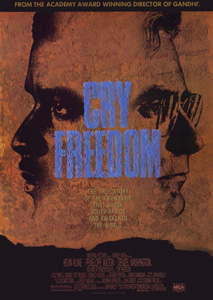
Back صرخة الحرية Arabic صرخه الحريه ARZ Вик за свобода Bulgarian Cry Freedom Catalan Volání svobody Czech Cry Freedom Welsh Cry Freedom Danish Schrei nach Freiheit German Cry Freedom Spanish Cry Freedom Basque
| Cry Freedom | |
|---|---|
 Theatrical release poster | |
| Directed by | Richard Attenborough |
| Screenplay by | John Briley |
| Based on | Biko and Asking for Trouble by Donald Woods |
| Produced by | Richard Attenborough |
| Starring | |
| Cinematography | Ronnie Taylor |
| Edited by | Lesley Walker |
| Music by | George Fenton Jonas Gwangwa |
Production company | Marble Arch Productions |
| Distributed by | Universal Pictures (United States) United International Pictures (International) |
Release dates |
|
Running time | 157 minutes |
| Country | |
| Languages | English Afrikaans Xhosa Zulu Sesotho |
| Budget | $29 million |
| Box office | $15 million (theatrical rentals)[2] |
Cry Freedom is a 1987 epic biographical drama film directed and produced by Richard Attenborough, set in late-1970s apartheid-era South Africa. The screenplay was written by John Briley based on a pair of books by journalist Donald Woods. The film centres on the real-life events involving South African activist Steve Biko and his friend Woods, who initially finds him too radical, and attempts to understand his way of life. Denzel Washington stars as Biko, while Kevin Kline portrays Woods. Penelope Wilton co-stars as Woods' wife Wendy. Cry Freedom delves into the ideas of discrimination, political corruption, and the repercussions of violence.
A joint collective effort to commit to the film's production was made by Universal Pictures and Marble Arch Productions and the film was primarily shot on location in Zimbabwe due to not being allowed to film in South Africa at the time of production. It was commercially distributed by Universal Pictures, opening in the United States on 6 November 1987. South African authorities unexpectedly allowed the film to be screened in cinemas without cuts or restrictions, despite the publication of Biko's writings being banned at the time of its release.[3]
The film was generally met with favourable reviews and earned theatrical rentals of $15 million worldwide. The film was nominated for multiple awards, including Academy Award nominations for Best Supporting Actor (for Washington), Best Original Score, and Best Original Song. It was nominated for seven BAFTA Awards, including Best Film and Best Direction, and won Best Sound.
- ^ a b "Cry Freedom (1987)". BFI Collections. Retrieved 18 July 2024.
- ^ "Foreign Vs. Domestic Rentals". Variety. 11 January 1989. p. 24.
- ^ Battersby, John D. (28 November 1987). "Pretoria Censors to Let 'Cry Freedom' Be Seen". The New York Times. ISSN 0362-4331.